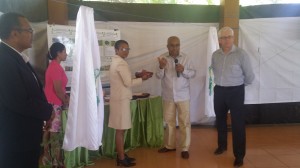Good seeds, good production

The Ministry of Agriculture and Fisheries (Portuguese acronym MAP) has already released seven varieties of good quality seeds, through the Seeds of Life programme [Fini ba Moris]. The event took place on April 7th, 2016, in the MAP’s hall, and was based on the certainty that “new varieties can increase production and ensure Timor-Leste’s food security”.
Nakroman rice and two varieties of sweet potato (Siano and Darasula with a yellow colour), mung beans (Lakateu and Klukae) and red beans (Ululefa and Fleixa) are the varieties which have already been released.
In this event, the Minister of State, Coordinator of Economic Affairs and Minister of Agriculture and Fisheries, Estanislau da Silva, stressed that he feels proud of the good results attained and of the efforts and dedication of the MAP’s National Directorate for Research, Statistics and Geographic Information.
“Good seeds will produce good harvests. Farmers devote their lives to produce seeds of life. This effort helps to ensure food security, because the outcome of these seeds contributes to the country’s economic development," stated Estanislau da Silva. The Minister added that all Directorates should work with professionalism.
On the same occasion, the head of the Australian team, John Dalton, stated that the Seeds of Life programme (launched in 2000, in the National Directorate for Research, Statistics and Geographic Information) will continue to disseminate good quality seeds to create better varieties. “The national seed system involves the participation of all farmers of Timor-Leste”, recalled John Dalton.
The Australian Ambassador, Peter Doyle, was proud with the MAP’s success and with the policy of the national seed system that has already been launched.” These seeds will be delivered to the Timorese, who work as pro-active farmers [informed], to help them become more productive”, said the ambassador.
The National Director of Research, Statistics and Geographic Information, Claudino Ninas Nabais recalled that the process of preparing these varieties started about 5 years ago. These seeds and materials have successfully passed the international institutions responsible for the CGIAR (Consultative Group on International Agricultural Research).
“We pick up many varieties of their seeds, between 20 and 40, and grow them in our land. We have tested these seeds in the Research Centers of Baucau, Aileu, Maubisse, Betano, Maliana and Loes, and also in farmers’ vegetable gardens," explained Claudino Nabais.
The Seeds of Life programme of the Ministry of Agriculture and Fisheries enjoys financial support from DFAT [Departament of Foreig Affairs and Trade] in Timor-Leste and the Australian Centre for International Agriculture Research.










































